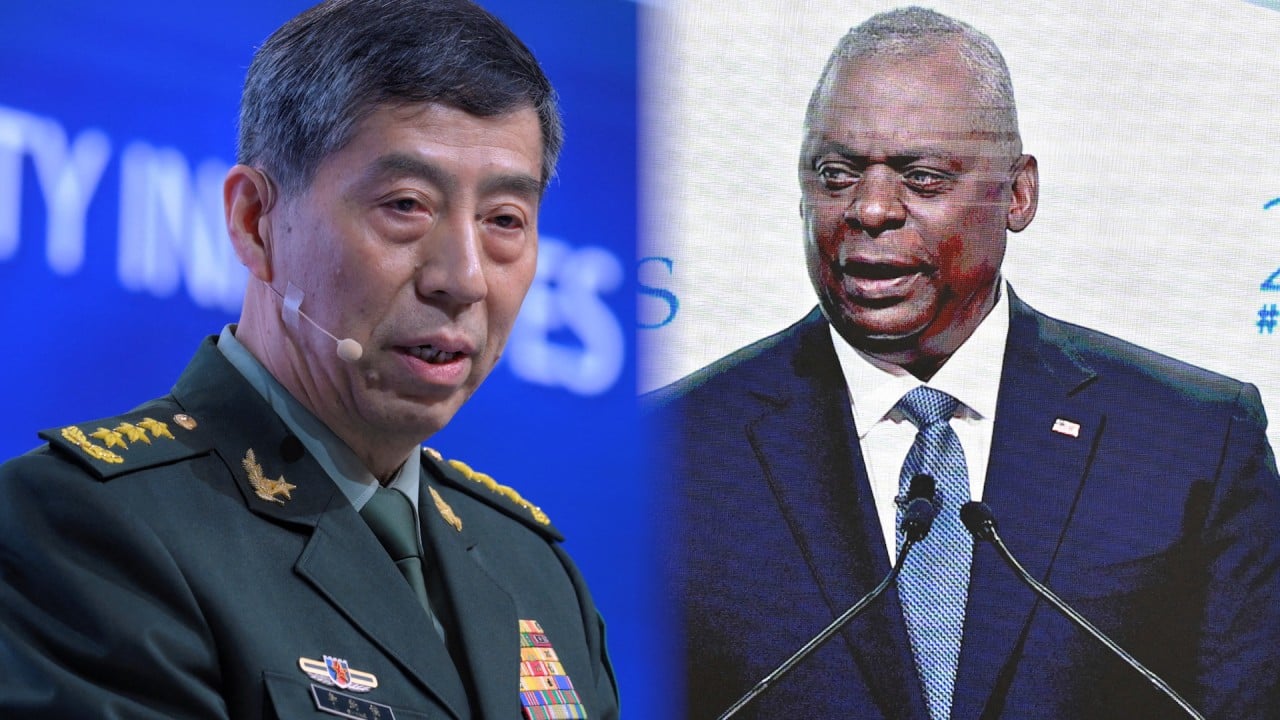
Shangri-La Dialogue: China and the US offer competing security visions for the Asia-Pacific
- Chinese defence minister accuses ‘some countries’ of launching proxy wars and leaving a trail of chaos in their wake
- ‘Bloc politics’ will destabilise the region, Li Shangfu says, a day after Lloyd Austin plays up US alliances
“Some countries intervene in the internal and regional affairs of other countries, frequently impose unilateral sanctions, threaten to use force, launch colour revolutions and proxy wars everywhere,” Li said to hundreds of defence analysts, officials and academics at Asia’s biggest security conference.
“They then leave after bringing chaos to a region, leaving behind a mess. We must not allow this to be replicated in the Asia-Pacific.”
The speech came on the last day of the conference where military officials from around the world held more than a hundred formal closed-door meetings.
Like Austin a day earlier, the Chinese defence minister tackled some of the big points of friction between the two countries: Taiwan and the South China Sea.
However, there was little overlap in the two visions presented.
Without naming the US, Li also accused “some country” of exceptionalism and double standards.
“Its so-called rules-based international order never tells you what the rules are, and who made these rules,” he said.
“Some countries even use treaties that it is not party to, to restrict others.”
One of those treaties is the United Nations Convention on the Law of the Sea, or Unclos. The US has not signed the convention but it recognises the obligations in it as binding customary international law.
The US Navy holds operations to assert the freedom of navigation in the South China Sea under Unclos despite objections from Beijing.
Li said such passages were not innocent but intended to provoke.
Unclos allows foreign ships to pass through the territorial sea of a coastal country when it does not harm its peace or security.
The rules of the sea were in sharp focus on the weekend when the US Indo-Pacific Command said a Chinese destroyer overtook and crossed the path of the USS Chung-Hoon at 137 metres (150 yards) in an unsafe way in the Taiwan Strait.
Austin said China had been involved in an “alarming number of risky intercepts”, and because of that the US would support its allies and partners to defend themselves against “coercion and bullying”.
Asked on Sunday about the encounter, Li questioned why incidents always happen near China, saying the best way to avoid them was for “other countries to manage their warplanes and warships”.
“What is key now is that we must prevent attempts to use freedom of navigation … as a pretext to exercise hegemony of navigation,” he said.
Amid concerns that dialogue between the US and Chinese militaries, and between the governments, had stopped, Li said communication channels at different levels remained smooth.
At the time of the Taiwan Strait incident, the US destroyer was sailing with the Canadian frigate HMCS Montreal, cooperation that the US Seventh Fleet said reflected the US approach to a secure and prosperous region.
In his speech, Li took aim at such US-led alliances in the Asia-Pacific.
He accused Nato of dividing Asia by expanding. Other PLA officers cited Japan’s plans to open a Nato liaison office and South Korea’s joining of a Nato cyber defence centre. Japanese Prime Minister Fumio Kishida, however, has already ruled out Japan joining the collective defence alliance.
“The crux of attempts at ‘Nato-fication’ of the Asia-Pacific is to hold regional nations hostage, promote conflict and confrontation, and plunge the Asia-Pacific into a whirlpool of division, disputes and conflicts,” he said.
“Bloc politics” – often how Beijing describes US alliance-building – would destabilise the region, he said.
While Li acknowledged a stark difference between the US and Chinese political systems, he said it should not stop the two countries from cooperating on matters of common interests.
“We in China believe that the key for countries to live in harmony is mutual respect and treating each other as equals,” he said.
“We are strongly opposed to imposing one’s own will on others, placing one’s own interests above those of others and pursuing one’s own security at the expense of others.”
On the sidelines of the conference, Senior Colonel Cao Yanzhong, research fellow with the PLA Academy of Military Sciences, said the “US deterrence strategy” could not deter the People’s Liberation Army from scaling down its deployment of aircraft and warships to drill around Taiwan.
However, that did not suggest the PLA would attack the island in 2027, the PLA’s centenary, he said. Beijing has described the 2027 milestone as a stage of military modernisation. Some US military officials have regarded 2027 as a year of a potential attack.
Drew Thompson, a visiting senior research fellow with the Lee Kuan Yew School of Public Policy in Singapore, said Li’s speech showed China’s words did not match its deeds.
“A big takeaway from that encounter was that the region believes that China’s actions do not match its rhetoric. China is saying the right things, but it’s not doing the right things,” he said.
Thompson, who was also the director for China, Taiwan and Mongolia in the US defence secretary’s office from 2011 to 2018, said two intercepts by Chinese forces had occurred in one week, events that were inconsistent with the memorandums of understanding between China and the US governing air and sea encounters.
“So, the question in the minds of everyone in the room is under what conditions will China live up to international rules and agreements that it has signed? Or why it doesn’t follow the rules that it has agreed to?”



